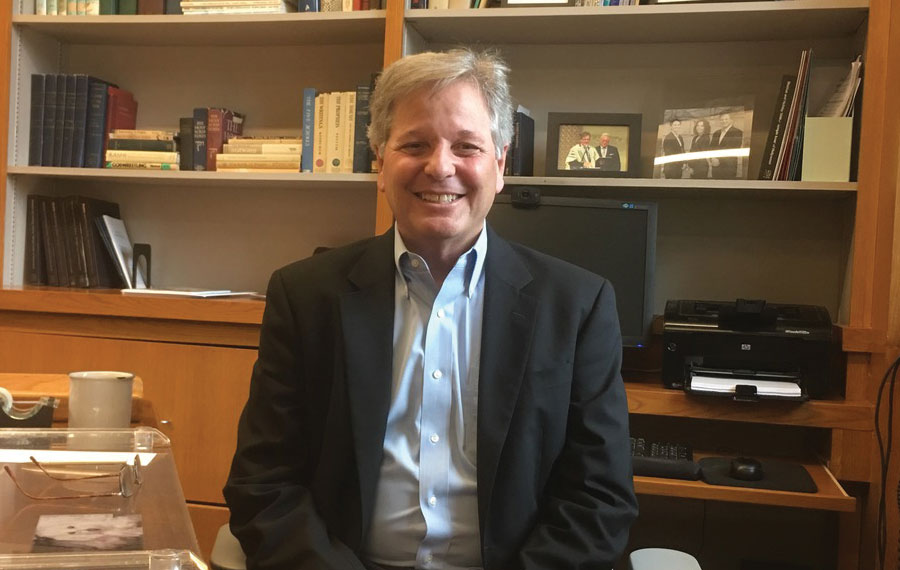 Rabbi John Rosove
Rabbi John Rosove Wearing eyeglasses and carrying a leather briefcase, Rabbi John Rosove looks more like a museum curator than a spiritual leader as he talks up the collection of Judaica displayed behind glass cases in Temple Israel of Hollywood’s (TIOH) lobby.
“These are all conversation pieces,” he said of the collection, which includes pieces TIOH members and philanthropists Judith and Bernard Briskin donated. You get the sense the artwork is one of many things he will miss when he retires on June 28 with a farewell Shabbat service.
Rosove, who will become the first rabbi emeritus in the congregation’s 92-year-history, expressed confidence the community he loves will thrive after he is gone because TIOH always has taken its cues from its congregants more than its leaders.
“If people are asked, ‘What is it about Temple Israel they love so much?’ virtually everybody says the community,” Rosove, 69, said. “It is a caring community. People take care of each other. It’s a large community but there are a lot of communities within the community, and my role as the senior rabbi has always been to step back and let not only senior staff but congregants take this congregation forward.”
While the congregation conducts a national search for a new senior rabbi, Peter Knobel will step in as interim rabbi, while Rabbis Michelle Missaghieh and Jocee Hudson will stay on as associate rabbis.
Rosove, whose love of Judaism was sparked while an undergraduate at UC Berkeley, was formally installed as TIOH senior rabbi on Feb. 24, 1989. When he joined the congregation, the synagogue had 475 families and the average age was “deceased,” Rosove said, quoting a synagogue leader.
Under Rosove’s leadership, the congregation grew to more than 900 families. He founded the synagogue’s K-6 day school, doubled down on the synagogue’s commitment to social justice, and provided a spiritual haven for a cross-section of people in the community.
A Democrat, Rosove has never shied away from incorporating politics and progressive Zionism into his congregation.
“You learn from your classic sources: the mentors, the teachers and eventually you hear your own voice and that voice — informed by what you learned — should take you forward.”
Regarding Israel, Rosove has aligned himself with the left-leaning J Street and the Association of Reform Zionists of America (ARZA). While the majority of his congregation is liberal, the community has not always received well his nuanced criticisms of Israel, he said.
“Personally, because I am known as a progressive Zionist, there are people in Los Angeles who hate my guts,” he stated, adding that he follows one of his mentors, the late and iconic liberal Rabbi Leonard Beerman, the founding rabbi at Leo Baeck Temple, who passed away in 2014.
“[He] taught me the importance of not holding back, but doing it responsibly and always basing whatever I say on reality and ethics as it comes up to us from the tradition,” Rosove said.
Discussing memorable moments from his career, Rosove cited his 2012 sermon where he announced his plans to officiate interfaith marriages as long as the couples committed to raising their kids Jewish. Before he could finish, congregants applauded, including many of the congregation’s non-Jewish members who finally felt welcome, Rosove recalled.
He said he also was proud of how the synagogue’s annual mitzvah day grew into the internationally known nonprofit organization Big Sunday, which, under the leadership of TIOH congregant David Levinson, offers year-round opportunities for giving back.
“The community, the day school, Big Sunday and then our social justice work here is second to none in the city,” Rosove said.
Historically, TIOH has attracted Hollywood entertainment-industry professionals. Today, the congregation continues to attract showrunners, writers and executives, along with those who work in politics, business, education and other fields. For his part, Rosove has aimed for TIOH to be a safe space for people who otherwise are overwhelmed by the draining demands of their challenging careers.
“We try to nurture those opposite values, and I think people like being here because of that,” he said. “It is a safe haven in a city where it is really Cowboy Land.”
As he prepares for life following TIOH, Rosove, with his wife, Barbara, plans to spend more time with family, including his 5-month-old granddaughter. He also is going to be mentoring a rabbinic student at Hebrew Union College-Jewish Institute of Religion and will continue working with the World Zionist Congress and ARZA. And he plans to spend time writing and playing golf.
“I won’t miss the rigors of the rabbinate. That’s what I am retiring from, because it is a 24/7 kind of position,” he said. “You are always on call, and I will be glad to have my time to wake up in the morning and feel like I’m doing whatever I want.”
Rosove added he hopes he is wiser and less rigid than the man he was 30 years ago. He compared his evolution in the rabbinate to a jazz musician starting out who is concerned with obeying the rules. As he grows and becomes more confident, he breaks free from convention but still respects tradition.
“You learn from your classic sources: the mentors, the teachers and eventually you hear your own voice and that voice — informed by what you learned — should take you forward,” he said. “So I am different in that I really know my own voice now, but I also understand the community and the tradition, and I am responsive and responsible to the tradition.”






















 More news and opinions than at a Shabbat dinner, right in your inbox.
More news and opinions than at a Shabbat dinner, right in your inbox.